Archives
-
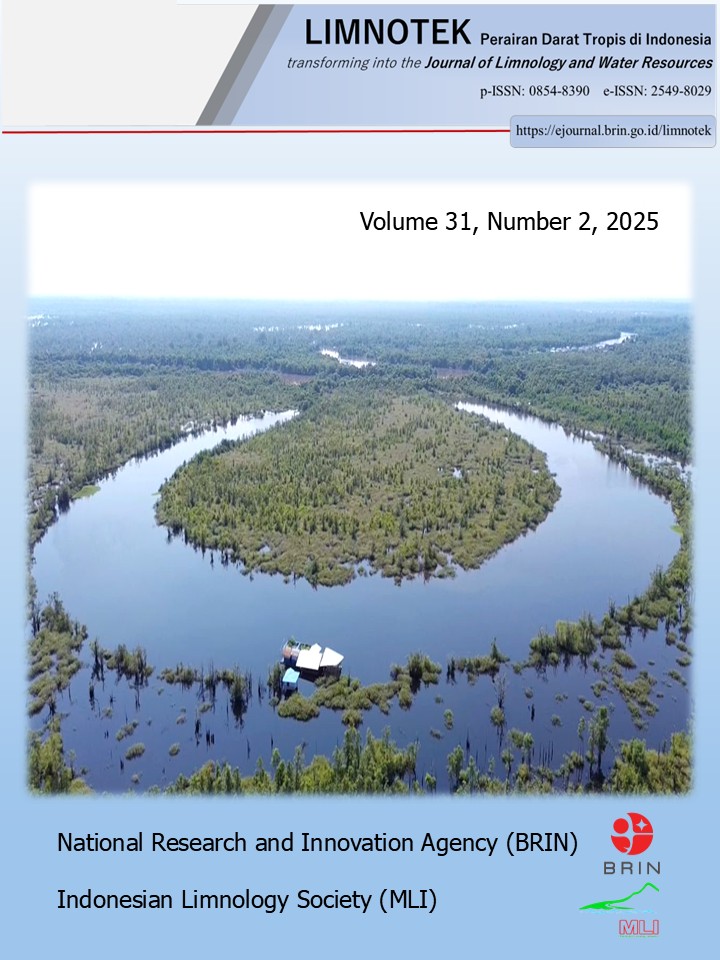
Vol. 31 No. 2 (2025)
Advancing Sustainable Water Management Through Research and Innovation: Bridging Knowledge to Impact
LIMNOTEK (English parallel title: Journal of Limnology and Water Resources) continuous to focus on establishing an integrated understanding of the interface between natural water processes, inland aquatic ecosystems, and human interactions.
In this 2025 volume 2 issue, we are proud to present a collection of five research articles and reviews that explore critical and interconnected aspects of limnology and water resources. Topics covered range from ecological assessments of key coastal and freshwater habitats to global trends in environmental technology. Two studies highlight the ecological significance of Indonesian aquatic systems: one investigates the role of Siombak Lake as a nursery and feeding ground for estuarine species in the Belawan area, while another examines the diversity and abundance of Scylla mangrove crabs on Jambu Beach in Dompu Regency. A bibliometric analysis provides insights into the development of diatom research, particularly in oxbow lake ecosystems, while another global review traces two decades of progress in ecotechnology for textile wastewater treatment. Completing the issue, an integrated field-theoretical evaluation offers a detailed examination of sediment pond efficiency within a tropical mining catchment, underscoring the importance of sediment management in disturbed landscapes. Together, these studies reinforce our commitment to advancing sustainable and science-based water resource management across diverse inland water systems.
Aligned with our vision of continuous learning, innovation, and collaboration, we hope this volume provides valuable insights for researchers, scholars, practitioners, the public, and policymakers to join us in advancing the sustainable use and management of lakes and water resources.
-
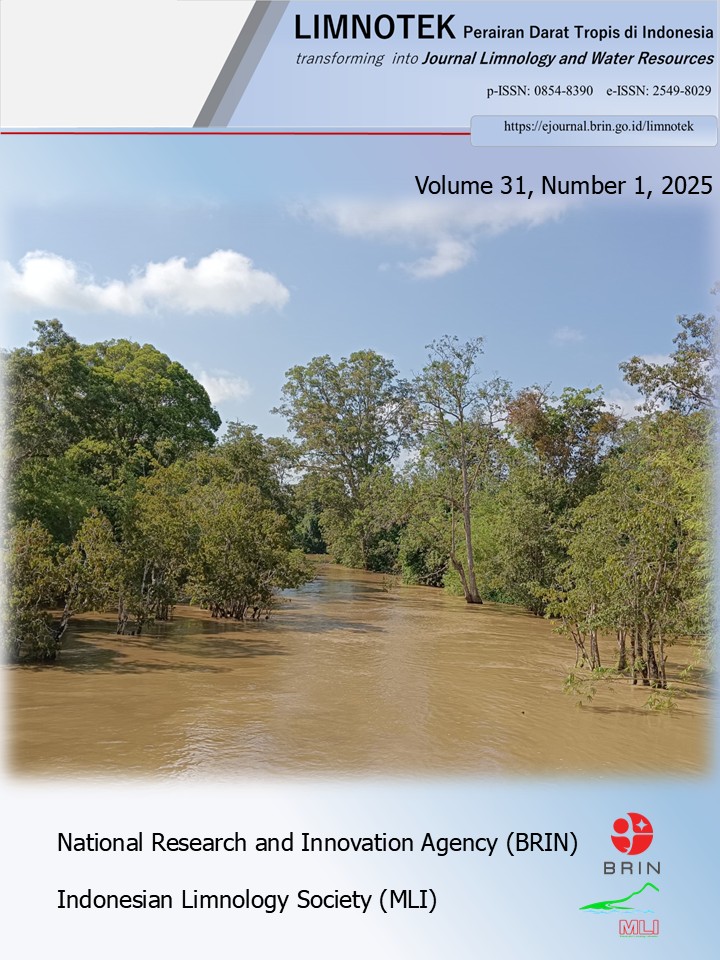
Vol. 31 No. 1 (2025)
Advancing Sustainable Water Management Through Research and Innovation: Bridging Knowledge to Impact
Limnotek, (English parallel title: Journal of Limnology and Water Resources) continuously focusing and scoping in establishing an integrated understanding of the interface between natural water processes, inland aquatic ecosystems, and human interactions.
In this 2025 volume 1 issue, we are proud to present a collection of nine research articles and reviews that explore critical and interconnected aspects of limnology and water resources. Topics covered spatial analyses of water quality drivers in reservoirs, groundwater potential mapping using geospatial techniques, the impact of land cover changes on river water quality, and the ecological risks of mercury contamination near mining areas. Two studies highlight the growing concern of microplastic pollution in aquatic ecosystems from fishponds in Banten to the digestive tracts of invasive catfish in the Citarum River. Other contributions explore innovative bioremediation approaches using fungi and food waste, as well as the ecological functions of vetiver root extracts. Together, these studies reinforce our commitment to advancing sustainable and science-based water resource management across diverse inland water systems.
Aligned with our vision of continuous learning, innovation, and collaboration, we hope this volume provides valuable insights for researchers, scholars, practitioners, the publics and policymakers to join us in advancing the sustainable use and management of lakes and water resources.
-
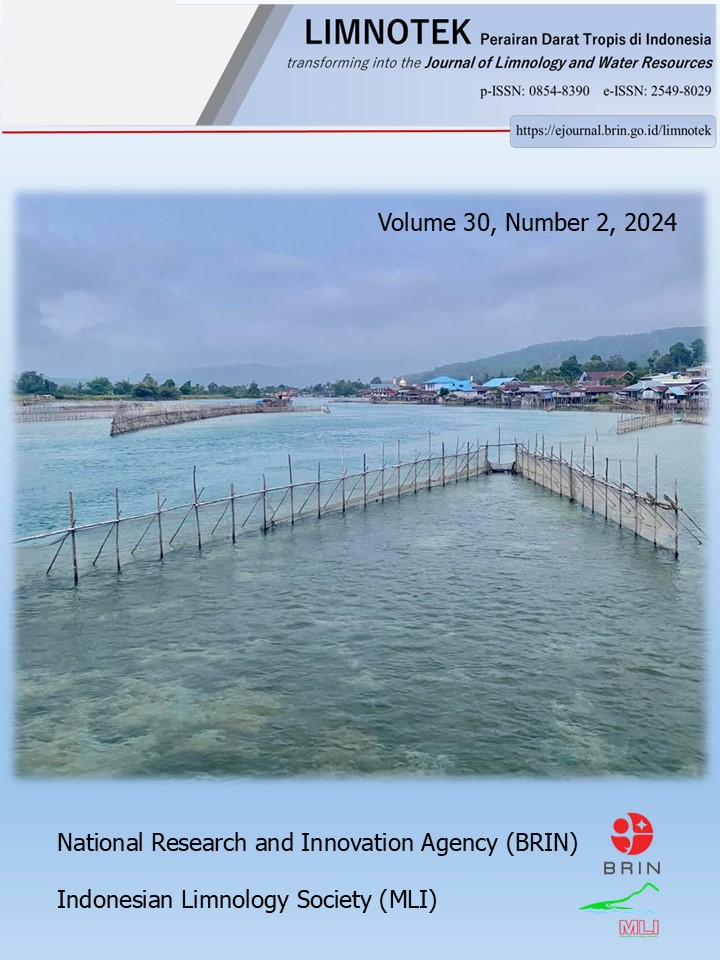
Vol. 30 No. 2 (2024)
Advancing Sustainable Water Management Through Research and Innovation
Limnotek transforming into Journal of Limnology and Water Resources (JLWR) continuously focusing and scoping in establishing an integrated understanding of the interface between natural processes of water resources and inland water ecosystems with their human domains.
In this 2024 (2) volume, we present six papers focusing on various topics in limnology and water resources. These include innovative technologies for wastewater treatment, eel conservation, a review of methane flux research, modeling agricultural water demand, water quality assessment of urban lakes and plankton community structure in estuaries — all contributing to the overarching goal of sustainable water resource management.
Aligned with our commitment to lifelong learning, innovation, and growth, we invite our readers to join us in our efforts toward the sustainable use and management of lakes and water resources.
-
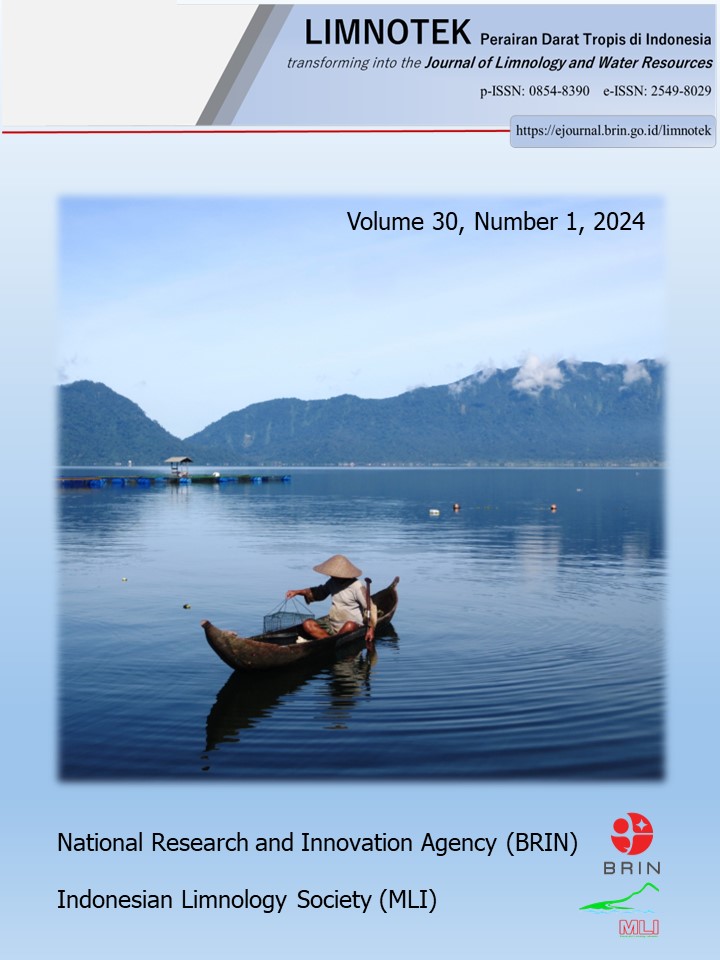
Vol. 30 No. 1 (2024)
Advancing Sustainable Water Management in the spirit of Water for Shared Prosperity
Recalling the successful 10th World Water Forum (WWF) 2024, held in the spirit of "Water for Shared Prosperity," Indonesia prioritized three key areas. First, the proposal of a World Lake Day, to commemorate lakes as a vital source of water that supports humans while providing social and economic benefits to society. Second, establishing a Center of Excellence for Water Security and Climate, aimed at capacity building, knowledge sharing, and utilizing superior facilities. Third, raising the issue of integrated water resources management on small islands.
The declaration aligns with our Limnotek transforming into Journal of Limnology and Water Resources (JLWR) focus and scope in establishing an integrated understanding of the interface between natural processes of water resources and inland water ecosystems with their human domains. Hence, it increased our motivation to continue exploring the intricate challenges and emerging opportunities in sustainable water and aquatic ecosystem management.
In this 2024 (1) volume, we present five research papers on key environmental and water resource issues, including the impact of weather changes on sulfide distribution in a tectonic deep lake, heavy metal contamination in a tropical lake, phosphate dynamics in coastal ecosystems, the efficacy of natural bentonite for dye removal in textile wastewater to address River pollution and Flood routing dynamics in the challenging topographic using UAV data. Hopefully, our publications offer valuable insights and foster a sustainable and harmonious relationship with our aquatic environment.
In alignment with our ethos of perpetual education, life, and growth, we extend an invitation to our readers to unite in our efforts to ensure that clean water becomes a symbol of our shared commitment to the well-being of our only one earth.
-
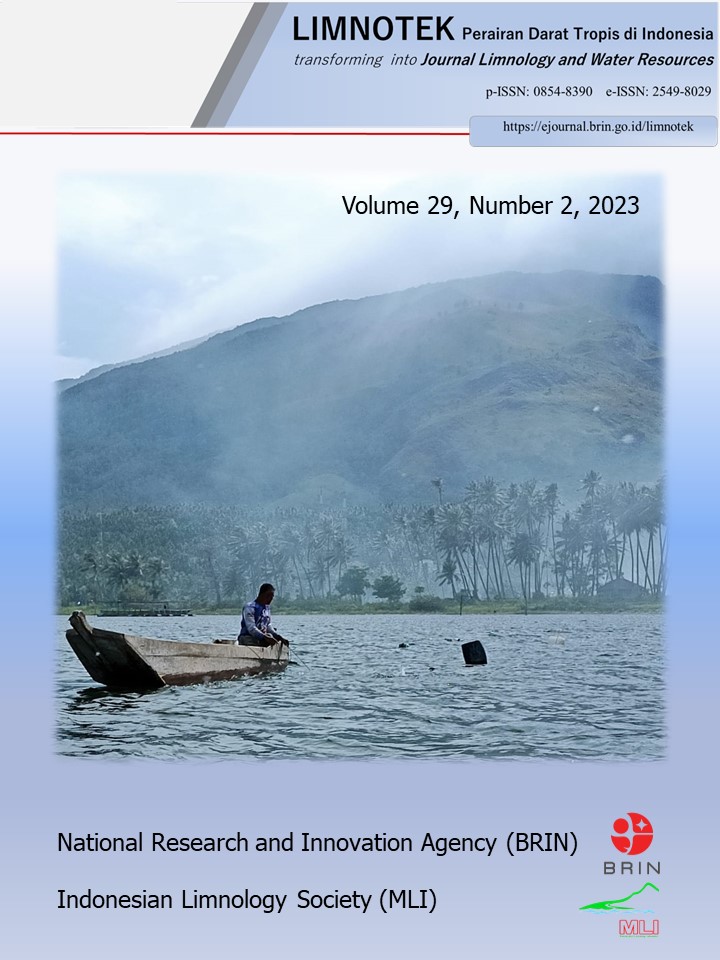
Vol. 29 No. 2 (2023)
Navigating Challenges in Sustainable Water Management
In this 2023 second edition, our journal delves further into challenges and opportunities in sustainable water and aquatic ecosystem management. The declared "decade of water" emphasizes the urgency of addressing global water issues, and this journal strives to answer this challenge.
We are grateful to present our refined publication this year, which features critical topics, such as catchment-scale erosion and the dynamics of hydro-chemical, pesticide accumulation on fish and sediment, floodplain lake biodiversity, and GHG emission mitigation in Asia.
This edition reflects the dedication of our contributors as well as our commitment to advancing water sciences, fostering global recognition for Limnotek, and serving as a communication platform. This small step is a part of our broader commitment to foster sustainable water and aquatic ecosystem management.
In the spirit of continual learning, living, and growing, we invite our readers to join us on this transformative journey. As we navigate the waters of global challenges, we remain steadfast in the pursuit of knowledge and solutions that contribute to a sustainable and harmonious coexistence with our aquatic environments. Together, let us strive for a future where clean water is not just a necessity but a shared responsibility and a testament to the resilience of the global scientific community.
-

Vol. 29 No. 1 (2023)
Demand for clean water has rapidly increased over the decade. This decade has been declared as the decade of water, which reflects the imperative of sustainable water and aquatic system management. Limnotek: Perairan darat tropis di Indonesia, one of the leading journals in Indonesia concerning the challenges over sustainable aquatic ecosystems, is answering the call by transforming to a global Journal entitled Journal of Limnology and Water Resources. This transformation is aimed to expand the communication among global scientific communities and stakeholders by highlighting further interdisciplinary issues related to both limnology and water resources sciences.
Although there has been a year's delay in our publication due to managerial issues and the transformation of the umbrella institution (BRIN), we are sincerely grateful that we can continue our new and polished publication this year. This current issue comprises critical topics such as the use of biotas to overcome the challenges of the reduction of polluted waters, the threat and potential control of alien invasive species, and research to aid the mitigation of hydroclimatic disasters.
Our continuing hard work can bring the journal to global acknowledgment as well as provide a better communication platform among the readers. Last but not least, this small step can lead to sustainable water and aquatic ecosystem management. We learn, we live, and we grow!






